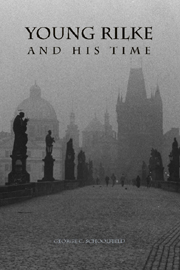2 - Larenopfer: A Commentary
from I - Prague
Published online by Cambridge University Press: 05 February 2013
Summary
No proof exists that Rilke, for several years a devoted fan of Detlev von Liliencron, ever got to know Liliencron's apostrophe to Prague in the sixteenth “Cantus” of his expanded autobiographical epic, Poggfred (1908). Liliencron toyed with the fancy that he had been born in the city, “perhaps a thousand years ago”; his heart is forsworn to it, although he has not forgotten Palermo (where he had evidently never been) and “Riben,” the medieval pearl that, just barely, had stayed inside Denmark's new borders after Prussia took away South Jutland in 1864. (As he is from Holstein and a German patriot, he uses Ribe's German name.) For Liliencron, “All Prague is a golden net of poems”; here, Liliencron uses the city's Czech name, both for the meter's sake and in recognition of the city's overwhelming Czech-speaking majority. At the apostrophe's conclusion he has a Czech tag: “Prague, greetings! My pledge of love is yours.” He saluted Prague again in Cantus 27, singling out the Hradschin, “Prague's splendor,” and Wallenstein's palace, “still more splendid.”
Rilke had reviewed the original Poggfred of 1896, calling it a “Wunderbuch,” in the Prague-German newspaper Deutsches Abendblatt on 11 January 1897 (SW 5:317–19), and returned to Prague from Munich to give a Poggfred reading and a talk about Liliencron's art at the “Deutscher Dilettantenverein” (German Dilettante Association). The brief review ended with a summons to attend the gathering, whose proceeds would go to the impoverished poet.
- Type
- Chapter
- Information
- Young Rilke and his Time , pp. 49 - 90Publisher: Boydell & BrewerPrint publication year: 2008



